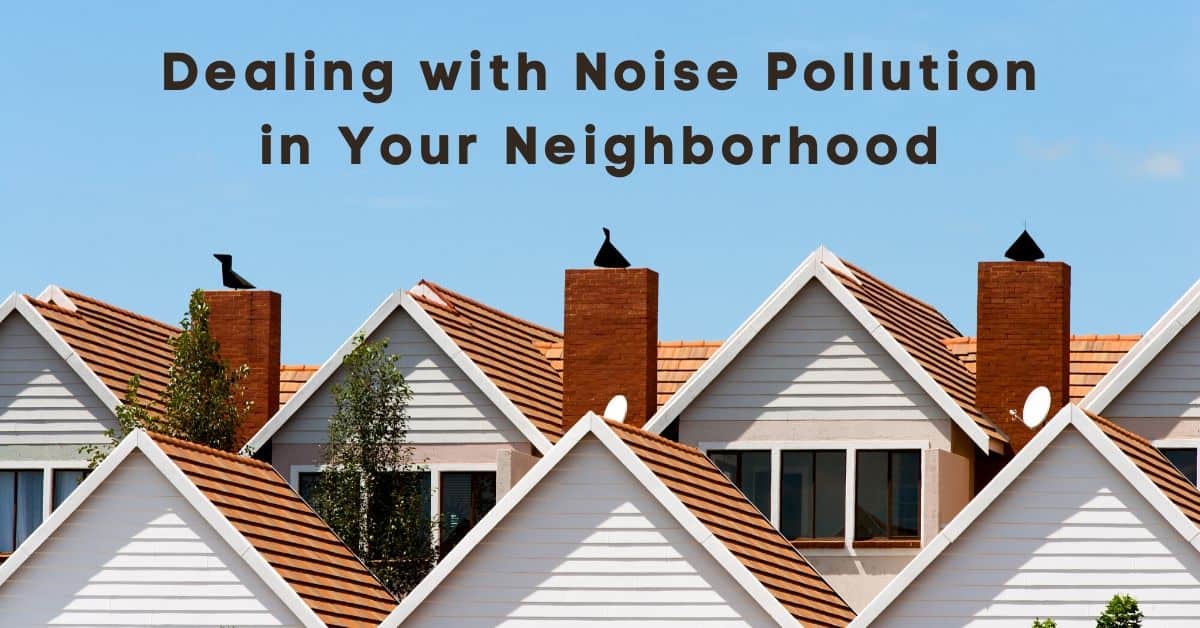- Meeting Someone With Hearing Loss - April 15, 2024
- How Your Hearing Health Influences Your Overall Health - April 5, 2024
- Urban Soundscapes: Navigating Busy Environments with Hearing Aids - March 26, 2024
We want our home to be a sanctuary. Although we live in our lives with constant turmoil and commotion, our homes should be a place for rest and relaxation – a refuge of our own making. However, with the noise in our neighborhoods and cities rising, it’s not always possible to achieve quiet in your home.
Sources of noise pollution in the neighborhood
Where you live is the most significant factor in your exposure to the level of noise you’re subjected to every day. If you live along a busy road, noise from the traffic will most likely take over if you open your window to get some fresh air. If you live near a school, kids in recess can be louder than you think. If you live in an airport’s vicinity, you get used to the sounds of planes taking off daily.
Even in regular neighborhoods, you will ensure lawnmowers, leaf blowers, and barking dogs.
The effects of noise pollution on health
In 2011, a report called ‘Burden of disease from environmental noise’ was released by the World Health Organization (WHO). This study collected data from several large-scale epidemiological studies of environmental noise in Western Europe for over ten years.
The studies analyzed environmental noise from aircraft, trains, and vehicles, and other sources in the city. They then looked at the connections to health conditions such as cardiovascular disease, sleep disturbance, tinnitus, children’s cognitive impairment, and stress.
Researchers found that at least one million years of life are lost in Europe alone due to noise emissions per year (and this number does not include noise from industrial workplaces).
The authors reasoned that ‘there is substantial evidence that exposure to ambient noise has detrimental effects on human health,’ and that traffic noise was ranked second among environmental risks to public health (after air pollution). The authors also said that while other pollution forms are diminishing, noise pollution was on the rise.
Exposure to constant or unnecessary noise has been shown to cause various health issues ranging from fatigue, impaired attention, productivity losses, coping difficulties and tiredness due to lack of sleep, to more severe problems such as cardiovascular disease, cognitive impairment, tinnitus and hearing loss.
What can you do to restore peace in your home
While we can’t always control what is happening outside our home, we can certainly reduce noise within our property. Here are a few tips:
- Soundproof cracks in doors and windows. If you need to block the noise from entering your house, search for areas where sound comes, such as drafty windows or door cracks. The windows can be resealed or covered, and the holes in doors caulked.
- Use soundproof curtains. Some “soundproof” curtains on the market will minimize incoming sound by around six dBA and block all sunlight.
- Consider roof insulation. Even if all of your doors and windows are soundproof, you could still have noise coming in through the ceiling or walls if one of these is not well-insulated enough for your neighborhood’s noise levels. Contact a contractor for more information.
- Build a fence or plant tall vegetation. A wall covered with ivy or a row of thick bushes can go a long way to keeping the sounds in your yard and home at safe levels.
- Use appliances that are energy efficient. Our home appliances play a part in noise pollution, so try to consider energy-efficient appliances because they tend to run much quieter. Installing an environmentally friendly item in your home means less noise, but it will also affect your peace of mind because you are actively protecting the world.
When hearing capacity starts to weaken, it will not improve. Hearing aids are a great way to maintain your ability to use your ears, but, in the first place, the best solution is to avoid hearing loss.
Take note of the noise levels in your neighborhood. Smartphone apps are available, which can measure sound levels. Download one, and see if the noise is regularly above 80 dBA around your home. If so, it’ll be worth taking steps now, in the long run, to reduce the amount of noise reaching your ears.
If you’re concerned about noise-induced hearing loss, the first step toward healthy hearing is to take a hearing test and establish a baseline of your hearing abilities. Contact us today to schedule an appointment!

